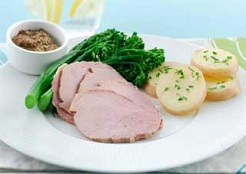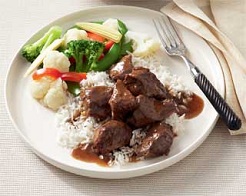Food Safety
Hygiene
Food poisoning has the potential to be a serious health problem, especially in the meat industry. Any person, who handles meat (or other foods), or in the home, has a significant responsibility to ensure that all necessary precautions are taken to avoid contributing to cases of food poisoning. By following the tips below, you can be assured that these precautions are being taken:
Cooking, heating and storing:
- It is safe to eat whole pieces of meat, such as steaks and roasts rare, as long as they have been stored and handled correctly (see below). Whole cuts of meat may have bacteria on the outside only, which are destroyed by the heat of the hot plate or oven when cooked.
- Mince, sausages, hamburger patties and rolled roasts however, should be cooked through to the centre, so that there is no visible pink meat, as the outside of the meat has been mixed right through the product and may contain bacteria.
- Meat should be cooked to at least 75°c and then kept above 60°c until served.
- When reheating food, ensure that it is heated right through to above 75°c
- 5°c – 60°c is considered to be the Temperature Danger Zone in which illness-causing bacteria will multiply.
- Keeping food out of the Temperature Danger Zone will slow down or avoid the growth of bacteria.
- Refrigerate cooked food as soon as possible, do not let it cool to room temperature first.
- Refrigerator temperature should be below 5°c
- Thaw frozen meat slowly in the fridge, not on the kitchen bench top. This will assist in keeping the product tender.
- Never refreeze thawed meat products.


Prepare and handle food hygienically:
- Ensure that cooked food does not come into contact with raw food (cross-contamination), as raw food can contain bacteria that cause illness.
- Use only clean knives, chopping boards and other food preparation equipment when preparing raw and cooked meat.
- Handle cooked or ready to eat meat with clean utensils only, do not use bare hands.
- Clean all surfaces thoroughly.
- If using gloves, use only clean disposable gloves and change them regularly using clean hands.
Maintain a high standard of personal hygiene and cleanliness:
- Wash your hands thoroughly with soap and warm water and dry them with disposable paper towel or an air dryer before handling food. Do not use a tea towel or your clothes to dry your hands. Repeat this frequently, especially after going to the toilet, handling garbage or animals, smoking or just having a break.
- Never smoke, chew gum or eat in a food handling or storage area.
- Ensure that long hair is tied back and/or contained with a hair net.
- Do not wear loose or hanging jewellery.
- Wear clean protective clothes (aprons etc) over normal clothes .


